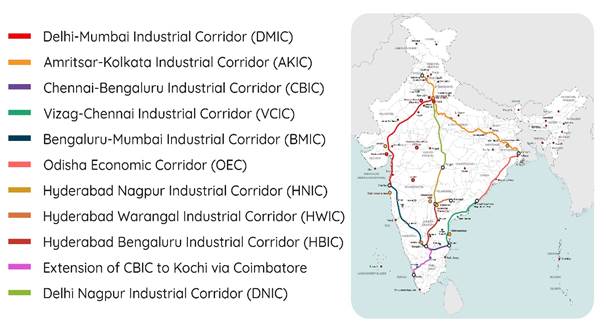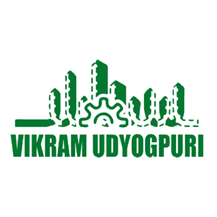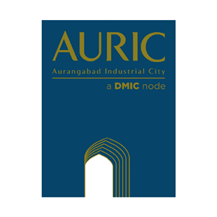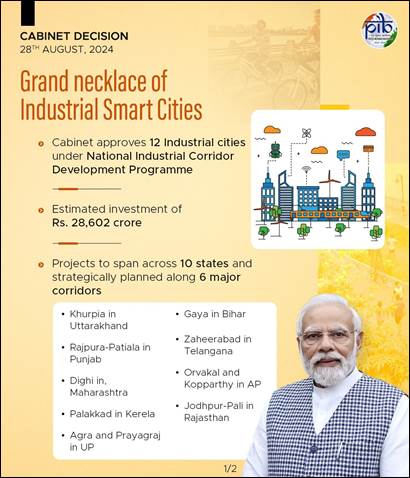Last Updated on August 30, 2024 6:09 pm by INDIAN AWAAZ
Cabinet Greenlights 12 New Industrial Cities Under NICDP
AMN
The approval of 12 new industrial nodes under the NICDP by the cabinet marks a significant milestone in India’s journey towards becoming a global manufacturing powerhouse. With a strategic focus on integrated development, sustainable infrastructure, and seamless connectivity, these projects are poised to redefine India’s industrial landscape and fuel the nation’s economic growth for years to come.
Beyond these new approvals, NICDP has already completed four projects, with another four currently under implementation. This continued progress underscores the government’s unwavering commitment to transforming India’s industrial sector and fostering a vibrant, sustainable, and inclusive economic environment.
The National Industrial Corridor Development Programme stands as India’s most ambitious infrastructure initiative, aiming to shape the future of urban and industrial development. This visionary programme seeks to create new industrial cities as “Smart Cities,” where next-generation technologies seamlessly integrate across various infrastructure sectors. By fostering the development of these futuristic industrial hubs, the Government of India is positioning the country as a global leader in manufacturing and investment, rivalling the world’s top destinations.
Central to this strategy is the development of integrated industrial corridors designed to accelerate growth in the manufacturing sector and promote systematic urbanisation. These corridors, supported by robust multi-modal connectivity and developed in collaboration with State Governments, are set to drive employment opportunities, economic growth, and overall socio-economic development across the nation.
Background
The National Industrial Corridor Development Programme began with the Delhi-Mumbai Industrial Corridor (DMIC) launch.
The Delhi Mumbai Industrial Corridor Development Corporation (DMICDC) Limited was established on 7th January 2008 as a Special Purpose Vehicle (SPV) under the administrative control of the Department for Promotion of Industry and Internal Trade (DPIIT), Ministry of Commerce & Industry. Its primary mission was to oversee project development activities and coordinate the implementation of various initiatives under the DMIC.
In December 2016, the scope of the DMIC Trust was broadened, leading to its reconstitution as the National Industrial Corridor Development and Implementation Trust (NICDIT). As a result, in February 2020, DMICDC Ltd. was renamed the National Industrial Corridor Development Corporation (NICDC) Limited. This change marked a significant milestone in India’s flagship ‘National Industrial Corridor Programme,’ with NICDC entrusted to spearhead the development of multiple industrial corridor projects across the country.
NICDC’s mandate includes project development activities for a wide range of initiatives, including investment regions, industrial areas, economic zones, industrial nodes, townships, integrated manufacturing clusters, and standalone or early-stage projects. It also provides vital support to various State Governments in these endeavours.
NICDC’s role extends to comprehensive project development, including preparing master plans, feasibility reports, and detailed project reports. Additionally, it acts as a key intermediary in developing and establishing infrastructure projects, facilitating the creation and distribution of financial instruments, negotiating loans, and designing schemes for resource mobilisation and credit extension for infrastructure development.
National Industrial Corridors
 11 corridors form the National Infrastructure Pipeline.
11 corridors form the National Infrastructure Pipeline.
Key Highlights of the Programme
- Strategic Investments: The National Industrial Corridor Development Programme (NICDP) aims to cultivate a dynamic industrial ecosystem by attracting investments from both large anchor industries and Micro, Small, and Medium Enterprises (MSMEs). These industrial nodes will serve as catalysts for achieving the ambitious target of $2 trillion in exports by 2030, aligning with the government’s vision of a self-reliant and globally competitive India.
- Smart Cities and Modern Infrastructure: NICDP will see the development of new industrial cities as greenfield smart cities of global standards. These cities will be built “ahead of demand,” incorporating the ‘plug-n-play’ and ‘walk-to-work’ concepts, ensuring advanced infrastructure that supports sustainable and efficient industrial operations.
- Area Approach on PM GatiShakti: Aligned with the PM GatiShakti National Master Plan, these projects will integrate multi-modal connectivity infrastructure, ensuring seamless movement of people, goods, and services. The industrial cities will serve as growth centres, transforming entire regions into vibrant economic hubs.
- Vision for a ‘Viksit Bharat’: The NICDP’s approval advances the vision of a ‘Viksit Bharat’ – a developed India. By positioning India as a key player in Global Value Chains (GVC), NICDP will offer developed land parcels ready for immediate allotment, facilitating domestic and international investors’ establishment of manufacturing units. This initiative aligns with the broader objective of creating an ‘Atmanirbhar Bharat’ or self-reliant India, driving economic growth through enhanced industrial output and employment.
- Economic Impact and Employment Generation: NICDP is expected to create substantial employment opportunities, with an estimated 1 million direct jobs and up to 3 million indirect jobs. This will provide livelihoods and contribute to the socio-economic upliftment of regions where these projects are implemented.
- Commitment to Sustainable Development: The NICDP projects strongly emphasise sustainability, incorporating ICT-enabled utilities and green technologies to minimise environmental impact. The aim is to create industrial cities that are not just economic powerhouses but also models of environmental stewardship.
Developed Greenfield Industrial Smart Cities
Dholera Special Investment Region, Gujarat
 Dholera Special Investment Region (DSIR) is a greenfield industrial smart city located 100 km southwest of Ahmedabad, designed to be India’s leading hub for manufacturing and industrial development. As the country’s first platinum-rated industrial smart city, it features the largest land parcels in Southeast Asia and targets key sectors like Defence, Aviation, High-Tech, and Pharmaceuticals. Established in 2016, Dholera Industrial City Development Ltd. (DICDL) is a Special Purpose Vehicle (SPV) formed as a joint venture, with the Government of Gujarat holding a 51% stake through DSIRDA and the Government of India holding a 49% stake through the NICDC Trust. The SPV focuses on sustainable, non-polluting industries to drive regional and national growth.
Dholera Special Investment Region (DSIR) is a greenfield industrial smart city located 100 km southwest of Ahmedabad, designed to be India’s leading hub for manufacturing and industrial development. As the country’s first platinum-rated industrial smart city, it features the largest land parcels in Southeast Asia and targets key sectors like Defence, Aviation, High-Tech, and Pharmaceuticals. Established in 2016, Dholera Industrial City Development Ltd. (DICDL) is a Special Purpose Vehicle (SPV) formed as a joint venture, with the Government of Gujarat holding a 51% stake through DSIRDA and the Government of India holding a 49% stake through the NICDC Trust. The SPV focuses on sustainable, non-polluting industries to drive regional and national growth.
Aurangabad Industrial Township Limited, Maharashtra
 Aurangabad Industrial City (AURIC) is a meticulously planned greenfield smart industrial city covering 10,000 acres in Maharashtra, developed as part of the Delhi-Mumbai Industrial Corridor (DMIC). Located near Aurangabad at Shendra and Bidkin, AURIC is managed by Aurangabad Industrial Township Limited (AITL), a Special Purpose Vehicle (SPV) between the Maharashtra Industrial Development Corporation (MIDC) and the National Industrial Corridor Development and Implementation Trust (NICDC Trust). The city dedicates 60% of its land to industrial use, with the remaining 40% for residential, commercial, and recreational facilities.
Aurangabad Industrial City (AURIC) is a meticulously planned greenfield smart industrial city covering 10,000 acres in Maharashtra, developed as part of the Delhi-Mumbai Industrial Corridor (DMIC). Located near Aurangabad at Shendra and Bidkin, AURIC is managed by Aurangabad Industrial Township Limited (AITL), a Special Purpose Vehicle (SPV) between the Maharashtra Industrial Development Corporation (MIDC) and the National Industrial Corridor Development and Implementation Trust (NICDC Trust). The city dedicates 60% of its land to industrial use, with the remaining 40% for residential, commercial, and recreational facilities.
Integrated Industrial Township, Greater Noida (Uttar Pradesh)
 DMIC Integrated Industrial Township Greater Noida Limited (DMIC IITGNL) is a Special Purpose Vehicle (SPV) Company incorporated as a 50:50 joint venture between the National Industrial Corridor Development and Implementation Trust (NICDIT) and Greater Noida Industrial Development Authority (GNIDA).
DMIC Integrated Industrial Township Greater Noida Limited (DMIC IITGNL) is a Special Purpose Vehicle (SPV) Company incorporated as a 50:50 joint venture between the National Industrial Corridor Development and Implementation Trust (NICDIT) and Greater Noida Industrial Development Authority (GNIDA).
Integrated Industrial Township, Vikram Udyogpuri (Madhya Pradesh)
 Delhi Mumbai Industrial Corridor Vikram Udyogpuri Limited (DMICVUL) is established to boost employment, industrial output, and regional exports by attracting quality industrial investments and providing world-class infrastructure. The Vikram Udyogpuri (VU) project is designed to create a sustainable economic base focusing on manufacturing and is supported by institutional, residential, and commercial activities. Located in Narwar village, 8 km from Ujjain and 12 km from Dewas, the project spans 442.3 hectares (1,096 acres) and features trunk infrastructure and supporting social and physical amenities, strategically positioned along State Highway 18 (SH-18) within the DMIC region.
Delhi Mumbai Industrial Corridor Vikram Udyogpuri Limited (DMICVUL) is established to boost employment, industrial output, and regional exports by attracting quality industrial investments and providing world-class infrastructure. The Vikram Udyogpuri (VU) project is designed to create a sustainable economic base focusing on manufacturing and is supported by institutional, residential, and commercial activities. Located in Narwar village, 8 km from Ujjain and 12 km from Dewas, the project spans 442.3 hectares (1,096 acres) and features trunk infrastructure and supporting social and physical amenities, strategically positioned along State Highway 18 (SH-18) within the DMIC region.
Cabinet Approval of 12 Industrial Nodes/Cities
India is on the cusp of a significant industrial transformation following the Cabinet Committee on Economic Affairs’ recent approval of 12 new project proposals under the National Industrial Corridor Development Programme (NICDP). This landmark decision, chaired by Prime Minister Shri Narendra Modi, involves an estimated investment of ₹28,602 crore. The initiative aims to create a strong network of industrial nodes and cities, driving economic growth and enhancing the country’s global competitiveness. These 12 industrial areas, strategically located across 10 states and planned along six major corridors, will be pivotal in advancing India’s manufacturing capabilities and economic expansion. The approved cities include:
- Khurpia, Uttarakhand
- Rajpura-Patiala, Punjab
- Dighi, Maharashtra
- Palakkad, Kerala
- Agra, Uttar Pradesh
- Prayagraj, Uttar Pradesh
- Gaya, Bihar
- Zaheerabad, Telangana
- Orvakal, Andhra Pradesh
- Kopparthy, Andhra Pradesh
- Jodhpur-Pali, Rajasthan

Approving 12 new industrial nodes under the NICDP marks a significant milestone in India’s journey towards becoming a global manufacturing powerhouse. With a strategic focus on integrated development, sustainable infrastructure, and seamless connectivity, these projects are poised to redefine India’s industrial landscape and fuel the nation’s economic growth for years to come.
Beyond these new approvals, NICDP has already completed four projects, with another four currently under implementation. This continued progress underscores the government’s unwavering commitment to transforming India’s industrial sector and fostering a vibrant, sustainable, and inclusive economic environment.
Conclusion
In conclusion, the National Industrial Corridor Development Programme (NICDP) represents a transformative initiative poised to reshape India’s industrial landscape and position the country as a global manufacturing leader. The recent Cabinet approval of 12 new industrial nodes underscores the government’s unwavering commitment to fostering economic growth, creating employment opportunities, and advancing sustainable development. These projects will not only bolster India’s manufacturing capabilities but also serve as catalysts for regional economic upliftment, driving the nation towards a vision of a self-reliant and developed India. As these industrial corridors come to fruition, they will play a pivotal role in shaping the future of India’s economy, enhancing its global competitiveness, and ensuring long-term prosperity for the nation.

